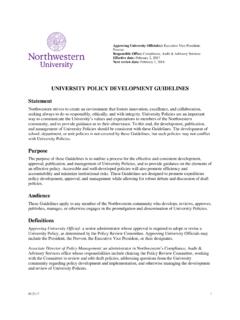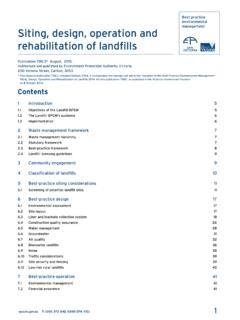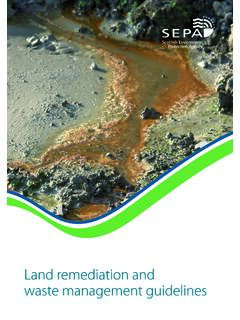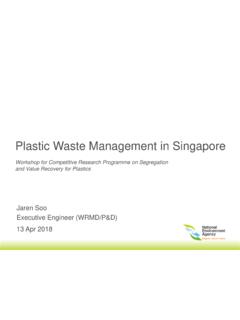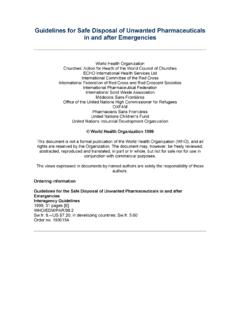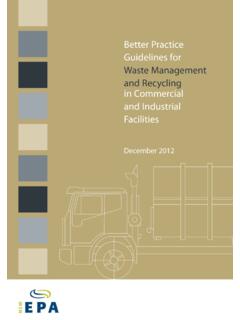Transcription of SUSTAINABLE WASTE MANAGEMENT POLICY
1 1 SUSTAINABLE WASTE MANAGEMENT POLICY POLICY Statement Northwestern is committed to enhancing the health and wellbeing of its campus community, to increasing safety practices, to reducing consumption of energy and fuels, to minimizing emissions, and to reducing solid and hazardous wastes. Members of the University community are expected to integrate into their daily operations best practices to reduce, reuse, and recycle materials, consistent with municipal, state, and federal rules and guidance. This POLICY applies to the MANAGEMENT of various types of generated solid and liquid wastes, as defined below. However, this POLICY does not apply to the MANAGEMENT of domestic sewage, the mixtures of domestic sewage allowable for sanitary disposal , or the MANAGEMENT of storm or irrigation water run-off. Purpose Northwestern endeavors to adopt practices that reflect a comprehensive approach to conserving resources and reducing and managing WASTE .
2 WASTE prevention, reuse, recycling, and composting are prioritized over landfill disposal . In order to minimize our environmental footprint; to provide guidance to the University community on best practices for reducing and recycling WASTE ; and to promote adherence to environmental law, this POLICY establishes a SUSTAINABLE , solid WASTE MANAGEMENT program that communicates acceptable methods of handling, storing, recycling, and disposing of materials. Audience All members of the Northwestern community, including students, researchers, faculty, staff, visitors, contractors, and vendors. Definitions Electronic WASTE or e- WASTE : electronic materials or appliances that are at the end of their useful life. Electronic equipment often contains sensitive data and hazardous materials (lead, chromium, cadmium, mercury, beryllium, nickel, zinc, brominated flame retardants, etc.) whose disposal is regulated. Common electronic appliances include computers, printers, monitors, microwaves, telephones, televisions, laboratory appliances, and refrigeration units (freezers, refrigerators, and air conditioners).
3 Approving University Official(s): Provost; Executive Vice President Responsible Office: sustainNU; Office for Research Safety; Office of Risk MANAGEMENT Effective date: October 2017 Next review date: October 2018 2 Hazardous WASTE : any material that (i) exhibits hazardous characteristics as defined by federal or state law, (ii) is unusable or unwanted in any way, and (iii) poses a potential hazard to individuals, the environment, or public health. Hazardous WASTE includes, but is not limited to, chemical, radioactive, or potentially infectious WASTE . For a list of examples of hazardous WASTE and detailed information on its disposal , see the Hazardous WASTE disposal Guide (aka Purple Guide ). Municipal solid WASTE : everyday items used and then thrown away, such as product packaging, grass clippings, furniture, clothing, bottles, food scraps, newspapers, and appliances. Municipal solid WASTE is commonly known as trash or garbage.
4 Non-research area: an area on University property that is not a teaching or research laboratory. Specially-regulated WASTE : a subset of hazardous WASTE comprising materials that are subject to specific regulations. Examples include potentially infectious medical WASTE (PIMW); other biological WASTE ; sharps WASTE ; asbestos WASTE ; regulated polychlorinated biphenyl (PCB) WASTE ; cutting oils and used oil; paint sludge; equipment cleanings; metallic dust sweepings; used solvents from parts cleaners; and off-specification, contaminated, or recalled wholesale or retail products. Universal WASTE : a category of WASTE materials designated as hazardous, but containing materials that are common or widely generated in the environment. Universal WASTE includes batteries, pesticides, lamps, thermostats, and other mercury-containing equipment. POLICY Implementation I. WASTE MANAGEMENT requirements A. Adherence to applicable law and University procedures.
5 All members of the Northwestern community are expected to handle, store, recycle, and dispose of materials in accordance with applicable law and University procedures, including all laws, regulations, and guidance documents referenced in this POLICY (see Related Information below; unless otherwise noted, the versions of such laws, regulations, and procedures currently in effect are to be followed). Specific guidelines relating to different types of WASTE are identified below. B. Municipal solid WASTE . WASTE streams such as non-hazardous wastes, recyclables, food wastes, and construction and demolition debris should be handled pursuant to sustainNU s Recycling Guidelines. C. Electronic WASTE . Illinois law bans most forms of electronic WASTE from landfills in the state. All University-owned electronic WASTE will be recycled through Facilities MANAGEMENT s E-Cycling Program and consistent with sustainNU s Recycling Guidelines.
6 D. Hazardous WASTE . All University-generated hazardous WASTE must be labeled, handled, stored, and disposed consistent with the Office for Research Safety (ORS) s Purple Guide, developed to ensure that the MANAGEMENT and disposal of hazardous WASTE at Northwestern is conducted consistent with applicable law, including the Resource Conservation and Recovery Act (RCRA). 3 Additionally, specially-regulated WASTE must be labeled, handled, stored, and disposed consistent with any additional applicable laws, regulations, or University guidelines, including the ORS guidelines applicable to the MANAGEMENT and disposal of biological/infectious, radioactive, and sharps WASTE . E. Universal WASTE . All University-generated universal WASTE must be labeled, handled, stored, recycled, and disposed consistent with Northwestern s Universal WASTE Guide. Any questions regarding the categorization of different types of WASTE or the guidelines applicable to their MANAGEMENT and disposal should be directed to either sustainNU, ORS, or the Director of Environmental Health and Safety in the Office of Risk MANAGEMENT (see Contacts below).
7 II. Implementation responsibilities A. Department and vendor leaders are responsible for: i. Reviewing operations to determine where WASTE can be reduced at its sources of generation; ii. Acquiring, to the extent feasible and practicable, items that are durable, have minimal packaging, or are readily recyclable when discarded; iii. Assessing purchasing decisions, making every attempt to purchase items only when needed and in amounts that are not excessive; iv. Ensuring employees have access to compliant WASTE containers, including containers for recycling; and v. Assuring only trained and certified employees, students, and vendors generate and label specially-regulated or hazardous wastes. B. Northwestern faculty, staff, students, and vendor personnel are responsible for: i. Separating defined WASTE types and placing identified WASTE materials in the appropriate containers; and ii. Handling specially-regulated or hazardous wastes only if trained and certified to do so.
8 C. Northwestern s Office of Procurement and Payment Services is responsible for: i. Prioritizing procurement of goods and services that have a less negative effect on human health and the environment; ii. Promoting the purchase of durable and environmentally preferable products and prioritizing these purchases over procurement of single-use or disposable products; and iii. Establishing contracts with vendors when necessary to responsibly handle University-generated WASTE . D. Northwestern s Office of Facilities MANAGEMENT is responsible for: i. Establishing policies for the MANAGEMENT of construction and demolition and executing construction and demolition contracts that include specific construction debris recycling targets; ii. Facilitating the removal of regulated refrigerants from refrigerators and freezers and maintaining the pertinent records required by law or regulation; 4 iii. Managing collection areas for the drop-off of universal WASTE in each building; iv.
9 Providing standard trash containers; and v. Maintaining contracts with custodial service providers responsible for collecting non-regulated E. sustainNU is responsible for: i. Managing all activities and services related to municipal solid WASTE disposal ; ii. Maintaining up-to-date procedures for reuse, recycling, and composting, as well as records of all WASTE reduction and recycling activities on campus; and iii. Providing standard recycling containers. F. Northwestern s Office for Research Safety (ORS) is responsible for: i. Maintaining up-to-date procedures and training on the proper disposal of hazardous, radioactive, biological, and potentially infectious wastes generated in teaching or research laboratories; ii. Providing approved containers for the disposal of hazardous, radioactive, biological, and potentially infectious wastes in teaching or research laboratories; and iii. Managing contracts for the disposal of all hazardous wastes and for hazardous WASTE emergency response services.
10 G. Northwestern s Office of Risk MANAGEMENT (ORM) is responsible for: i. Maintaining procedures for the handling and disposal of hazardous and universal WASTE in non-research areas; ii. Training all non-research employees handling hazardous WASTE about proper WASTE handling procedures, safe use of personal protective equipment, and emergency procedures; and iii. Ensuring non-research departments follow all contractual hazardous WASTE and hazardous WASTE emergency response services requirements. H. Northwestern s Office of Human Resources, through its myHR Learn system, serves as a records repository of completion of required trainings2 for those employed by Northwestern. For various reasons, ORM or ORS may maintain other training records outside of the myHR Learn system. Consequences of Violating this POLICY Northwestern faculty, students, or staff who fail to comply with the laws, regulations, and ordinances referenced in this POLICY (see Related Information below) could be subject to disciplinary action under University policies and procedures, including termination of employment or academic dismissal.
